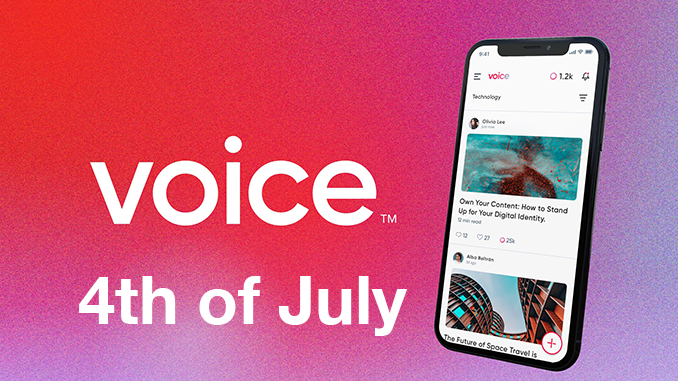
Under the name Voice, the project of a novel social network has been arousing curiosity for about a year. Now it has become known that Voice will be launched in part on 4 July on the occasion of US Independence Day, earlier than expected.
In June 2019 Block.one, the Blockchain company behind EOS, announced its Voice project. Social networks, led by Facebook and Instagram, are undemocratic and driven by business interests. Voice is an alternative, where a tamper-proof Blockchain is supposed to guarantee integrity and a Voice Token, a native crypto currency, supports the project. So far the theory spread by Block.one. Since then, a lot has happened at Voice and now it seems to be decided to switch Voice live. Voice CEO Salah Zalatimo announced on Twitter that the platform would be launched to the general public on July 4. From then on, everyone will be able to read contributions on Voice, but the writing of content and commenting will remain reserved for registered users for the time being.
We pivoted, and decided to open up our platform for readers on July 4. Only registered user will be able publish or engage. Registration will remain by request until August 15, when users can begin to invite heir friends.
— Salah Zalatimo (@Salafel) June 5, 2020
The date 4 July is the US Independence Day and thus symbolically chosen. US President Donald Trump repeatedly accuses established media and, more recently, social networks of “fake news” and censorship. Zalatimo writes that the social aspects of the Internet must be snatched away from the big tech companies. This is why the decision was made to launch Voice earlier than planned. From 15 August, registered users will be able to invite friends to Voice, who will then be able to post and comment on the site themselves. Up to now, registration has only taken place on request and must be activated by Voice.
Can Voice revolutionize the topic of social media?
Block.one gave Voice a cash injection of 150 million US dollars in March, but at the same time withdrew from Voice’s management. Another source of irritation was the news that Voice, contrary to earlier announcements, was not using Blockchain from EOS as its technological basis. A beta programme of Voice has been running since mid-February, but has hardly generated any public attention.
On the other hand, Facebook and Co. are being looked at with suspicion not only by President Trump. With the already established services, private data is collected on a large scale and turned into a business model through advertising. Censorship allegations – always a hot topic in the USA – also put networks such as Twitter or YouTube in a quandary time and again: legislators demand, for example, that misleading posts that glorify violence and racism be deleted centrally. But where is the dividing line between allowed expression of opinion and not allowed posts? A clear answer to this question is hard to find.
Voice makes a clear identification of its users a prerequisite when registering, so people will know their real names and Voice does not guarantee true anonymity. Whether and, if so, how Voice will also block users or remove contributions will only be shown in the practical test from 4 July. The Voice Token as a utility token is hardly likely to play a role for investors. And positive side effects for EOS are also not to be expected from the replacement of EOS technology and Block.one. The question remains: does the online world really need another social network?
Best place to buy Bitcoin or EOS:

Leave a Reply